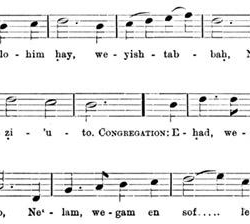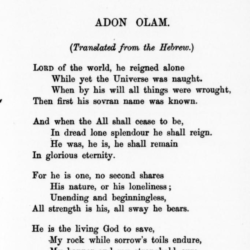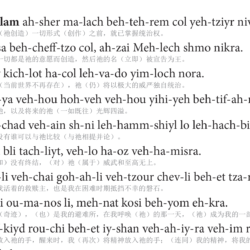TOGGLE COLUMNS (on/off):ADJUST COLUMN POSITIONS: select the column header cell and drag it where you want. show me!COPY INDIVIDUAL COLUMN(S): use CopyTables, a browser extension.
| Source (Hebrew) | Translation (English) |
|---|---|
אֲדוֹן עוֹלָם אֲשֶׁר מָלַךְ בְּטֶֽרֶם כׇּל־יְצִיר נִבְרָא׃ לְעֵת נַֽעֲשָׂה כְּחֶפְצוֹ כֹּל אֲזַי מֶֽלֶךְ שְׁמוֹ נִקְרָא׃ |
Universal Lord! who the sceptre sway’d Ere creation’s first wondrous form was framed: When by his will divine all things were made, Then King, Almighty, was his name proclaim’d! |
וְאַֽחֲרֵי כִּכְלּוֹת הַכֹּל לְבַדּוֹ יִמְלֹךְ נוֹרָא׃ וְהוּא הָיָה וְהוּא הֹוֶה וְהוּא יִֽהְיֶה בְּתִפְאֲרָה׃ |
When all shall cease, and this world’s system o’er, Then he tremendously alone will reign: Who was, who is, and will evermore In most refulgent glory still remain |
וְהוּא אֶחָד וְאֵין שֵׁנִי לְהַמְשִׁיל לוֹ לְהַחְבִּירָה׃ בְּלִי רֵאשִׁית בְּלִי תַּכְלִית וְלוֹ הָעֹז וְהַמִּשְׂרָה׃ |
Sole God! unequall’d and beyond compare: Without division or associate; Without commencing date, or final year Omnipotence is his, and regal state. |
וְהוּא אֵלִי וְחַי גּֽוֹאֲלִי וְצוּר חֶבְלִי בְּיוֹם צָרָה׃ וְהוּא נִסִּי וּמָנוֹס לִי מְנָת כּוֹסִי בְּיוֹם אֶקְרָא׃ |
He is my God, my living Redeemer, My shelt’ring rock in a distressed hour; My refuge, my standard, and protector, My lot’s disposer, when I seek his power |
בְּיָדוֹ אַפְקִיד רוּחִי בְּעֵת אִישַׁן וְאָעִֽירָה׃ וְעִם רוּחִי גְּוִיָּתִי אֲדֹנָי לִי וְלֹא אִירָא׃ |
Into his hands my spirit I consign. Whilst wrapt in sleep, and when again I wake: And with my spirit my body I resign The Lord’s with me, no fears my soul shall shake. |
“Adon Olam” is a piyyut that became popular in the 15th century and is often attributed to Solomon ibn Gabirol (1021–1058) and less often to Sherira Gaon (900-1001), or his son, Hai ben Sherira Gaon (939-1038). The variation of the piyyut appearing here is the 10 line (5 stanza) version familiar to Ashkenazi congregations. (Sefaradi siddurim have 12 line (six stanza) variants, and there are some with 14 or 15 lines.) The translation appearing here by Tsvi Hirsch Filipowski (1816-1872) is as found on page 2 of his siddur Tefilot Yisrael (1862).
Source(s)


“אֲדוֹן עוֹלָם (אשכנז) | Adōn Olam, translated by Tsvi Hirsch Filipowski (1862)” is shared through the Open Siddur Project with a Creative Commons Public Domain Dedication 1.0 Universal license.







Comments, Corrections, and Queries